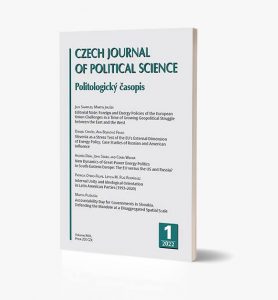New dynamics of great-power energy politics in South-Eastern Europe: The EU versus the US and Russia?

Deák András – Szabó John – Weiner Csaba
Czech Journal of Political Science/Politologický časopis,
Vol. 29, No. 1, 32–49 (2022)
Abstract
South-Eastern European (SEE) countries are typically keen to maintain the status quo in their energy systems, generally characterized by underinvestment, high coal share and utility affordability needs. Their energy mixes have historically been determined by external factors, currently mainly related to decarbonization pressure. This article assesses how the EU’s ongoing decarbonization-driven withdrawal from supporting natural gas projects shapes fuel choices in nine selected SEE countries and may have geopolitical consequences. It is based on more than 70 interviews with stakeholders from these countries, EU institutions, and international organizations. In exploring and theorizing the geopolitical ramifications of the energy transition in SEE, it applies a novel approach, which draws on theories of power and the concept of an assemblage, which we link to theories on entanglement and disentanglement. We find that the EU’s climate policy significantly changes local infrastructural assemblages and the EU’s disentanglement from natural gas goes against Russian and US efforts. By wielding its power to support such an energy transition, the EU has shifted the bipolar system ‘EU/US vis-à-vis Russia’ defined along a single geopolitical ruleset (supply security), to a tripolar disposition ‘EU-Russia-USA’ defined along two rulesets (supply security and climate policy). In addition, China has become involved. States will thus have to take crucial energy policy decisions in a new geopolitical context.
Key words: energy transition; South-Eastern Europe; assemblage; natural gas; geopolitics; EU; Russia


